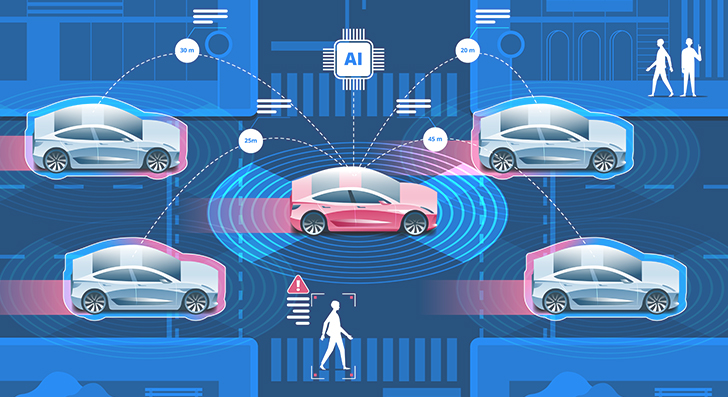You might have seen an autonomous vehicle trying to navigate through a bustling city. To do so safely and effectively, it needs to recognize and differentiate between various objects and elements on the road such as pedestrians, vehicles, traffic lights, road signs, and more. Data annotation enables the AI model to correctly identify and classify these elements, facilitating a seamless and secure journey. Without accurate data annotation, the autonomous vehicle would be akin to a driver with obscured vision, unable to make informed decisions and navigate a complex environment.
The impact of AI/ML-based models, powered by data annotation, extends far beyond autonomous vehicles. Businesses across a multitude of sectors have recognized the transformative potential of these technologies. From healthcare to finance, e-commerce to agriculture, AI and ML models are driving innovation, efficiency, and profitability.

Consider the healthcare industry, for instance. AI-driven medical imaging solutions are revolutionizing diagnostics. Models learn from accurately labeled medical images and can identify abnormalities and diseases with unprecedented precision, assisting with earlier detection and improving patient outcomes. This not only saves lives but also reduces the burden on healthcare systems.
In the retail sector, e-commerce platforms use AI-powered recommendation engines to personalize product suggestions for customers. Data annotation ensures that products are correctly categorized and tagged, leading to more accurate and appealing recommendations. This personalization enhances the customer experience, drives sales, and fosters brand loyalty.
Prerequisites for Data Annotation in Machine Learning
Data annotation is indispensable for the development and training of AI systems as it provides the models with the context necessary to understand and interpret the world around them. Careful consideration of important prerequisites will help ensure that your annotations are accurate, consistent, and reliable for training your models:
-
Data Collection and Preprocessing
Data is the lifeblood that fuels the engines of innovation in Artificial Intelligence and Machine Learning. Therefore, gathering the right data for annotation is essential as the quality of the input dataset significantly impacts the performance of the Machine Learning algorithm. Collecting a diverse and representative dataset that covers a full range of cases the model is expected to encounter in the real world is a good practice. Additionally, you should preprocess the data to remove noise, handle missing values, and standardize the format for annotation. After all, high-quality data will result in high-quality annotations.
- Quality Control and Iteration
Quality control is an ongoing process throughout the annotation phase as garbage in is garbage out. Companies need to establish a system to validate annotations for accuracy and consistency. For instance, you can randomly select and re-annotate a data subset to measure inter-annotator agreement. Inconsistent or erroneous annotations should be flagged and corrected. As the annotation progresses, consider revising guidelines or providing additional training if issues arise.
- Annotation Guidelines
Develop comprehensive and clear annotation guidelines that provide instructions to human annotators. These guidelines should specify the labeling criteria, examples of each category, and any potential edge cases. Clear instructions help ensure consistency among annotators, reducing annotation errors and biases. You may need to iterate on these guidelines as you uncover challenges during annotation.
- Annotator Training
Even with clear guidelines, it’s crucial to provide training to your annotators. This training can include both theoretical and practical aspects. Annotators should understand the task, guidelines, and any domain-specific knowledge required. Training sessions can also involve practice annotation tasks to ensure annotators are proficient before starting on the actual dataset. Regular feedback and communication with annotators are essential to address any questions or issues that may arise during annotation.
Compliant, Ethical, and Quality Data Annotation Services
Different Approaches to Data Annotation
Ever since their invention, computers have been good at one thing—following instructions. And this is what traditional programming involves. But at this point in time, the gulf between traditional programming and relatively autonomous programs is enormous. To ‘teach’ the computers to make autonomous decisions, AI developers need immense volumes of specially prepared ‘training’ data.
Ironically, it’s an uphill task to make a machine capable of performing repetitive tasks—because, paradoxically, humans must first undertake a substantial amount of repetitive work. That said, businesses can choose from different options to get their data annotation tasks done:
-
Crowdsourcing
Crowdsourcing involves leveraging a distributed group of people, often from online platforms, to perform data annotation tasks. Even though it is a good option to control costs, this approach has some serious flaws. The quality of output depends upon the freelancer and since these are short-term contracts, there are no mechanisms for feedback or further improvements. Last of all, data security and privacy can be challenging when using a crowd.
- Outsourcing
Outsourcing data annotation tasks to a data annotation specialist is a popular choice for many businesses. Working day in and out on such tasks, they follow strict quality control measures, making it a reliable option. Top data annotation companies usually have extensive experience in ensuring that labels are accurate and consistent.
- Captchas
One overlooked aspect of daily online activities—we actually provide data annotation services for free by completing CAPTCHA forms during the sign-up process. Google is the primary beneficiary of this practice, as users trying to verify their non-robot status provide unpaid labeling assistance for various objects, such as cars, trains, boats, and traffic signs.
- In-House Team
Building an in-house team for data annotation is a go-to option for major companies as it offers more control over the process and data security. At the same time, it can be resource-intensive, requiring recruitment, training, and ongoing management. In-house teams may also struggle to match the expertise of dedicated data annotation specialists.
Selecting the most appropriate data annotation method hinges on three factors – the scale and complexity of the project, budget availability, and data quality thresholds. Consider facial image recognition as an example. A mid-sized firm is developing a casual app to apply funny filters to images. In this case, neither the data quality has to be of a very high accuracy or fidelity, nor the budget has to be huge.
In contrast, there’s a government project for suspect identification that is to be used for defense and law enforcement purposes. Obviously, this is a complicated project with large volumes of data, significant security implications, and a massive budget. The approach to data annotation in such a project will be poles apart from the one for a casual social media app.
Data Annotation Companies as the Best Bet
While all different approaches have their merits, outsourcing data annotation to professionals stands out as the most suitable option for several reasons:
- Professional Excellence: Professional providers specialize in this field, often employing diversely skilled annotators and data experts with extensive experience. They understand the nuances of various industries and can provide annotations that meet specific requirements.
- Versatility: Data annotation companies have the infrastructure and workforce to scale operations according to project needs. This scalability and adaptability are invaluable when dealing with large datasets or fluctuating workloads.
- Quality Control: Quality assurance is a top priority for a dedicated data annotation company. The professionals implement rigorous quality control processes to ensure accuracy, consistency, and compliance with industry standards. This dedication to quality reduces the risk of errors in AI models.
- Competitive Pricing: Outsourcing data annotation can be more cost-effective than maintaining an in-house team, as it eliminates recruitment and training expenses. This cost-saving option can provide major support to startups and SMEs in the current economic climate.
Bottom Line
Data annotation companies play a critical role in shaping the future of AI and ML. By ensuring that AI models have access to accurate, labeled data, these companies empower businesses to disrupt and innovate across various industries. According to reports, the global data annotation market was worth $ 0.8 billion in 2022. Following the CAGR of 33.2%, this number is expected to reach $ 3.6 billion by the end of 2027. As AI continues to advance, data annotation specialists will remain at the forefront, driving the next wave of AI-powered innovation and transformation.





